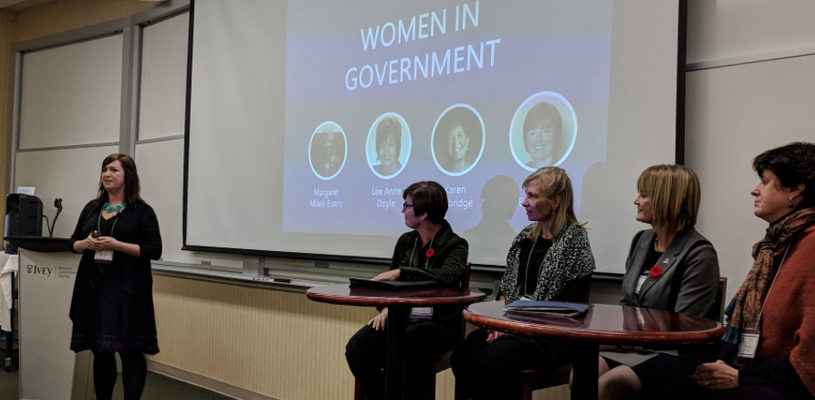Empowering women in local government

Recently, four strong female leaders in municipal government participated in a panel discussion – Empowering Women in Local Government – at the Western University Local Government Alumni Conference.
Speakers:
- Karen Farbridge, President of Karen Farbridge & Associates
- Joni Baechler, former Mayor of the City of London
- Margaret Misek-Evans, CAO for the City of Sarnia
- Lee Anne Doyle, former first female Executive Director of Building/Chief Building Official at the City of Windsor
Of all elected officials, only 25 percent are female. This unacceptable statistic is what pushes women currently working in municipal government to encourage and advocate for more female leadership in government.
Question #1: Why is it an issue that women are underrepresented in government?
Baechler – To have a strong democratic foundation of government, you need equal representation for all. You need all perspectives when making decisions on city building, and what services are offered. We need a female’s perspective, especially on the big issues like reproductive rights and prostitution.
Misek-Evans – Females have a unique perspective. Females are under more scrutiny, especially in senior government roles. We need to equal out the balance in government and all workplaces.
Doyle – There is a need for mentorship. Many women don’t think they are a good fit/the right candidate for the job. Current leaders/peers, both men and women, need to encourage women to apply and run for positions in government.
Farbridge – Women govern differently, they build a coalition and come to consensus quicker than men. We need a balance between men and women, as women look at the big picture/longevity of a project, while men come up with solutions quicker for the short term.
Question #2: What can be done to see more women as leaders?
Farbridge – Women get a ton of abuse, they know the system is biased; so why would they put themselves through it? We need a system of zero tolerance regarding abuse toward women in positions of leadership.
Doyle – Most cities have a male dominated economy, we need to push young girls to continue studies in math, science, politics, engineering, and more so they can become leaders in male dominated fields.
Misek-Evans – Women need to focus on being strong and stay focused on their goals. Culture is very difficult to change.
Baechler – Current leaders need to look around and evaluate the diversity/representation in their organization. Are there females? People of colour? Different backgrounds? If not, the organization needs to adjust its hiring policies, and make sure the workplace is safe for all and abuse free.
Question #3: Do you have role models?
Baechler – I have tried to find a role model in every aspect of life, personal and professional. If you have someone to look to and learn from in different areas, you will succeed.
Misek-Evans – Males can be great mentors too, and men need to push for equality since government is a male dominated industry.
Doyle – Teachers. Teachers need to push their students into leadership roles and into fields of study that are not female dominated. Join professional organizations and find a mentor; in male dominated sectors, it is ok to have a male mentor.
Farbridge – On average, men are asked once to lead/run/apply to a position of leadership, while women need to be asked several times before they actually consider it. No one will give you permission to lead.
Question #4: What is one piece of advice for women looking to lead in government?
Farbridge – Act. Don’t think too much on it; just act.
Doyle – Find your passion, and stretch yourself to be the best at it.
Misek-Evans – Know yourself, and what you believe in.
Baechler – Be secure in yourself, and your abilities.
Question #5: What work-life sacrifices do you have to make?
All women in the panel agreed – you need a supportive partner, and to talk about expectations with your partner so you both are on the same page about how work and life will balance. If you have children, incorporate them in your work, and teach them the importance of work-life balance.
Seventy-five percent of women are caregivers. If there are very few or no women in your organization, what are the barriers? As a society, we need to take a look at the policies in place that are impacting the ability for women to be active leaders in the workplace and adjust so that they have more opportunities. MW


